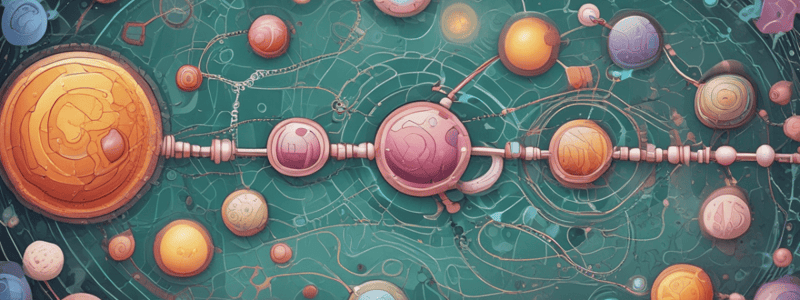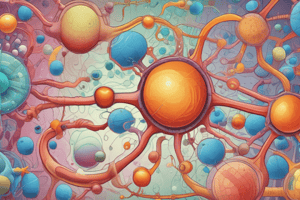Podcast
Questions and Answers
What is the byproduct of glycolysis when oxygen is absent?
What is the byproduct of glycolysis when oxygen is absent?
- NADH and NADPH
- Ethanol and CO2 (correct)
- Pyruvate
- Lactate
Which pathway occurs simultaneously with glycolysis and provides breakdown of pentose sugars and glucose?
Which pathway occurs simultaneously with glycolysis and provides breakdown of pentose sugars and glucose?
- Glycolysis
- Entner-Doudoroff Pathway
- Cellular Respiration
- Pentose Phosphate Pathway (correct)
What is the result of glucose breakdown in the absence of oxygen?
What is the result of glucose breakdown in the absence of oxygen?
- Cellular Respiration
- Aerobic Respiration
- Glycolysis
- Fermentation (correct)
What is the byproduct of the Entner-Doudoroff Pathway in terms of energy molecules?
What is the byproduct of the Entner-Doudoroff Pathway in terms of energy molecules?
What is the site of glycolysis in cellular respiration?
What is the site of glycolysis in cellular respiration?
Which type of bacteria uses the Entner-Doudoroff Pathway for glucose degradation?
Which type of bacteria uses the Entner-Doudoroff Pathway for glucose degradation?
What is the purpose of the Pentose Phosphate Pathway in terms of nucleic acid synthesis?
What is the purpose of the Pentose Phosphate Pathway in terms of nucleic acid synthesis?
What is the result of glucose breakdown in the presence of oxygen?
What is the result of glucose breakdown in the presence of oxygen?
What is the primary requirement for the breakdown of pyruvate into carbon dioxide and water?
What is the primary requirement for the breakdown of pyruvate into carbon dioxide and water?
Which phase of respiration generates ATP from reduced substrates?
Which phase of respiration generates ATP from reduced substrates?
What is the primary factor that affects bacterial growth?
What is the primary factor that affects bacterial growth?
Which of the following is NOT a factor affecting bacterial growth?
Which of the following is NOT a factor affecting bacterial growth?
What is the purpose of flaming test tubes in a microbiology laboratory?
What is the purpose of flaming test tubes in a microbiology laboratory?
Which of the following is NOT a type of microbial growth phase?
Which of the following is NOT a type of microbial growth phase?
What is the purpose of streak plating in a microbiology laboratory?
What is the purpose of streak plating in a microbiology laboratory?
What is the difference between gram-positive and gram-negative bacteria?
What is the difference between gram-positive and gram-negative bacteria?
Which type of bacteria can survive in the dry state for several decades?
Which type of bacteria can survive in the dry state for several decades?
Which bacteria require oxygen as a terminal electron acceptor in their respiratory chain?
Which bacteria require oxygen as a terminal electron acceptor in their respiratory chain?
What percentage of CO2 is supplied for heterotrophic bacteria in culture?
What percentage of CO2 is supplied for heterotrophic bacteria in culture?
What is the term for bacteria that require an excess amount of CO2?
What is the term for bacteria that require an excess amount of CO2?
What is the approximate percentage of water in a bacterial cell?
What is the approximate percentage of water in a bacterial cell?
Which type of bacteria can resist drying for months?
Which type of bacteria can resist drying for months?
What is the term for bacteria that can survive without oxygen?
What is the term for bacteria that can survive without oxygen?
What is the term for bacteria that require oxygen for growth?
What is the term for bacteria that require oxygen for growth?
What is the primary function of the tricarboxylic acid (TCA) cycle in microorganisms?
What is the primary function of the tricarboxylic acid (TCA) cycle in microorganisms?
Which type of microorganisms can cycle carbon compounds to yield energy in anaerobic environments?
Which type of microorganisms can cycle carbon compounds to yield energy in anaerobic environments?
What is the temperature range at which thermophilic bacteria can grow?
What is the temperature range at which thermophilic bacteria can grow?
What is the effect of sudden exposure to hypertonic solutions on bacterial cells?
What is the effect of sudden exposure to hypertonic solutions on bacterial cells?
What is the pH range at which most bacteria can grow?
What is the pH range at which most bacteria can grow?
Which type of bacteria requires sunlight for growth?
Which type of bacteria requires sunlight for growth?
What is the effect of exposure to light on photochromogenic mycobacteria?
What is the effect of exposure to light on photochromogenic mycobacteria?
What is the purpose of adding 0.5% NaCl to culture media?
What is the purpose of adding 0.5% NaCl to culture media?
Which type of anaerobes can tolerate the presence of oxygen?
Which type of anaerobes can tolerate the presence of oxygen?
Which phase of the bacterial growth curve is characterized by cell activity but not growth?
Which phase of the bacterial growth curve is characterized by cell activity but not growth?
What is the primary method of cell division in the log phase of bacterial growth?
What is the primary method of cell division in the log phase of bacterial growth?
Which type of microbes grows in low concentrations of oxygen (5%)?
Which type of microbes grows in low concentrations of oxygen (5%)?
In which phase of bacterial growth do antibiotics and disinfectants have the most effect?
In which phase of bacterial growth do antibiotics and disinfectants have the most effect?
What is the primary characteristic of the stationary phase of bacterial growth?
What is the primary characteristic of the stationary phase of bacterial growth?
Which of the following is NOT a phase of bacterial growth?
Which of the following is NOT a phase of bacterial growth?
What is the primary purpose of the lag phase in bacterial growth?
What is the primary purpose of the lag phase in bacterial growth?
What is the primary function of the pentose phosphate pathway in relation to glucose breakdown?
What is the primary function of the pentose phosphate pathway in relation to glucose breakdown?
What is the end product of the Entner-Doudoroff pathway in terms of glucose breakdown?
What is the end product of the Entner-Doudoroff pathway in terms of glucose breakdown?
What is the primary electron carrier involved in the electron transport chain?
What is the primary electron carrier involved in the electron transport chain?
What is the site of glycolysis in cellular respiration?
What is the site of glycolysis in cellular respiration?
What is the byproduct of glycolysis when oxygen is present?
What is the byproduct of glycolysis when oxygen is present?
What is the function of glucose in nearly all cells?
What is the function of glucose in nearly all cells?
What is the primary requirement for the breakdown of pyruvate into carbon dioxide and water?
What is the primary requirement for the breakdown of pyruvate into carbon dioxide and water?
What is the purpose of flaming test tubes in a microbiology laboratory?
What is the purpose of flaming test tubes in a microbiology laboratory?
In which phase of respiration does the electron transport chain generate ATP from reduced substrates?
In which phase of respiration does the electron transport chain generate ATP from reduced substrates?
Which pathway is used by some bacteria to break down glucose into pyruvate?
Which pathway is used by some bacteria to break down glucose into pyruvate?
What is the primary purpose of the Pentose Phosphate Pathway?
What is the primary purpose of the Pentose Phosphate Pathway?
What is the site of the Electron Transport Chain in cellular respiration?
What is the site of the Electron Transport Chain in cellular respiration?
What percentage of a bacterial cell consists of water?
What percentage of a bacterial cell consists of water?
Which type of bacteria can survive in the dry state for several decades?
Which type of bacteria can survive in the dry state for several decades?
What is the primary role of oxygen in bacterial growth?
What is the primary role of oxygen in bacterial growth?
Which type of bacteria requires an excess amount of CO2?
Which type of bacteria requires an excess amount of CO2?
What is the approximate percentage of dry weight that CO2 represents in a bacterial cell?
What is the approximate percentage of dry weight that CO2 represents in a bacterial cell?
Which factor affects bacterial growth by controlling the availability of water?
Which factor affects bacterial growth by controlling the availability of water?
What is the term for bacteria that can survive without oxygen?
What is the term for bacteria that can survive without oxygen?
Which type of bacteria can resist drying for months?
Which type of bacteria can resist drying for months?
Flashcards are hidden until you start studying
Study Notes
Energy Sources and Electron Carriers
- Triphosphate is a compound that is oxidized to release energy and is also called an electron donor.
- Electron carriers carry electrons that are removed during the oxidation of energy sources.
Glucose Breakdown
- Glucose is a key energy-storing molecule that is metabolized by almost all cells for energy.
- Glucose metabolism is relatively simple, and other organic molecules are converted to glucose for energy harvesting.
- Glycolysis is the breakdown of glucose to pyruvate, yielding two molecules of ATP per molecule of glucose.
- If oxygen is absent, fermentation occurs, and pyruvate is converted into lactate or ethanol and CO2.
- If oxygen is present, cellular respiration occurs.
Alternative Pathways to Glycolysis
- Pentose Phosphate Pathway (Hexose Monophosphate Shunt) occurs simultaneously with glycolysis and breaks down pentose sugars and glucose.
- Intermediate pentoses are used for nucleic acid synthesis and amino acid synthesis.
- This pathway is an important producer of reduced coenzyme NADPH used for biosynthetic reactions.
- Entner-Doudoroff Pathway uses 6-phosphogluconate dehydratase and 2-keto-3-deoxyphosphogluconate aldolase to create pyruvate from glucose.
- This pathway produces 1 molecule of NADH, 1 molecule of NADPH, and 1 molecule of ATP.
Glucose Breakdown Overview
- Cellular respiration breaks down pyruvate into carbon dioxide and water.
- This process requires oxygen and generates ATP from reduced substrates.
Electron Transport Chain
- The electron transport chain is the last phase of respiration, generating ATP from reduced substrates.
- It consists of a sequence of carrier molecules through which electrons pass.
- The electron transport chain occurs in the plasma membrane and is different in different bacteria.
Factors Affecting Bacterial Growth
- Water: 80% of bacterial cells consist of water, and dehydration is detrimental to most bacteria.
- Oxygen: Most life forms depend on oxygen for survival and growth.
- Carbon dioxide: Autotrophic organisms use CO2 as a source of carbon, while heterotrophic bacteria require some CO2 from exogenous sources.
- Temperature: Psychrophiles grow below 20°C, mesophiles grow between 20-40°C, and thermophiles grow at higher temperatures.
- Hydrogen Ion Concentration: Most bacteria have an average pH requirement of 7.2-7.6.
- Light: Most bacteria prefer darkness for growth, while some require sunlight.
- Osmotic Pressure: Bacteria have a wide range of osmotic tolerance, and 0.5% NaCl is added to culture media to provide suitable osmolarity.
Microbial Growth Requirements
- Physical growth factors include gaseous and humidity requirements.
- Based on O2 requirements, microbes can be divided into microaerophilic, aerophilic, and anaerobic categories.
Bacterial Growth Curve
- The bacterial growth curve represents the number of live cells in a population over time.
- There are four distinct phases: lag phase, exponential (log) phase, stationary phase, and death phase.
Bacterial Growth Curve Phases
Lag Phase
- Characterized by cell activity but no growth.
- Bacteria adjust to the new environment, synthesizing proteins, enzymes, RNA, and other molecules necessary for multiplication.
Log (Exponential) Phase
- Time of rapid cell doubling, with cells dividing regularly by binary fission.
- Metabolic activity is high, generating DNA, RNA, cell wall components, and other substances necessary for growth.
- Antibiotics and disinfectants are most effective during this phase.
Energy Sources
- Triphosphate is an energy source compound that is oxidized to release energy, also known as an electron donor.
- Electron carriers carry electrons that are removed during oxidation of the energy source.
Glucose Breakdown
- Glucose is a key energy-storing molecule that is metabolized by nearly all cells for energy.
- Glucose metabolism is fairly simple, and other organic molecules are converted to glucose for energy harvesting.
- Glycolysis breaks down glucose to pyruvate, yielding two molecules of ATP per molecule of glucose, and occurs in the cytosol without requiring O2.
- If oxygen is absent, fermentation occurs, and pyruvate is converted into either lactate or ethanol and CO2.
- If O2 is present, cellular respiration occurs.
Alternative Pathways to Glycolysis
- Some bacteria have alternative pathways for glucose degradation, such as the Pentose Phosphate Pathway and the Entner-Doudoroff Pathway.
- The Pentose Phosphate Pathway occurs simultaneously with glycolysis, providing breakdown of both pentose sugar and glucose.
- The Entner-Doudoroff Pathway uses 6-phosphogluconate dehydratase and 2-keto-3-deoxyphosphogluconate aldolase to create pyruvate from glucose, producing 1 molecule NADH, 1 molecule NADPH, and 1 molecule of ATP.
Glucose Breakdown Overview
- Cellular respiration breaks down pyruvate into carbon dioxide and water, requiring oxygen.
- Fermentation occurs in the absence of oxygen.
Electron Transport Chain
- The electron transport chain is the last phase of respiration, generating ATP from reduced substrates.
- It consists of a sequence of carrier molecules through which electrons pass.
- The electron transport chain occurs in the plasma membrane and is different in different bacteria.
Factors Affecting Bacterial Growth
- Water is essential for bacterial growth, making up 80% of the bacterial cell.
- Oxygen is required for most bacteria as a terminal electron acceptor in their respiratory chain.
- Carbon dioxide is provided by cellular metabolism and the environment, and is required for autotrophic and heterotrophic bacteria.
- Temperature, hydrogen ion concentration, light, osmotic pressure, and symbiosis and antagonism also affect bacterial growth.
Aseptic Techniques and Health and Safety
- Ensuring a contamination-free environment is crucial in a microbiology laboratory.
- Sterilized equipment should be easily accessible, and working beside a Bunsen burner creates an upward flow of air through convection.
- Test tubes containing sensitive biological samples should be flamed around the cap and neck, and agar plates should be opened facing away from the user.
Microbiology/Immunology Lab
- Streak plating is a technique used in microbiology laboratories.
Independent Study
- Bacteria can be classified into two broad categories: gram positive and gram negative.
- Each category has different growth requirements and type of culture media.
Bacterial Growth Factors
- Water, oxygen, carbon dioxide, temperature, hydrogen ion concentration, light, osmotic pressure, and symbiosis and antagonism are factors that affect bacterial growth.
Studying That Suits You
Use AI to generate personalized quizzes and flashcards to suit your learning preferences.




